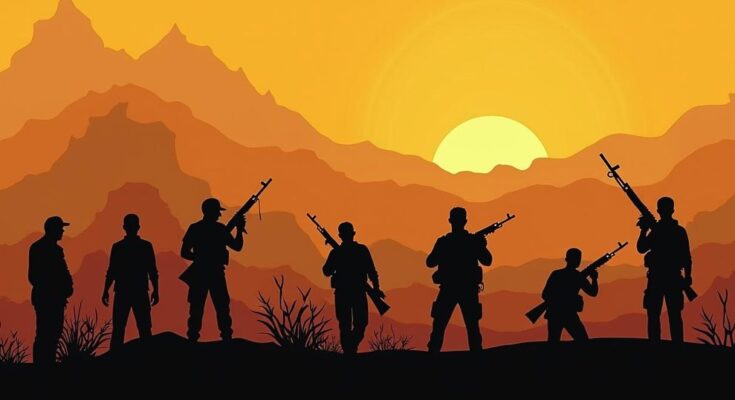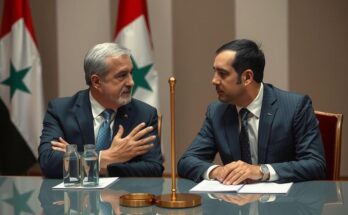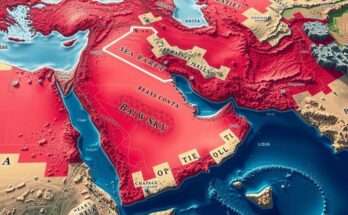The recent killing of Hezbollah leaders has intensified internal debates within Iran about its response to Israel, with hardliners pushing for retaliation. While Iranian officials officially maintain a stance against direct military engagement to avoid escalation, pressure mounts for support to Hezbollah. Political infighting reveals concerns about Iran’s regional deterrent capabilities and its nuclear negotiations, as leaders weigh the risks of action versus restraint.
The elimination of key Hezbollah leadership figures has placed significant pressure on the Iranian government, which currently maintains that it will not deploy troops to bolster Hezbollah in Lebanon. However, internal political dynamics reveal a growing call from hardliners who view the situation as a failure to adequately confront Israeli aggression. The recent killing of Brigadier General Abbas Nilforushan, the Islamic Revolutionary Guard Corps (IRGC) deputy commander for Lebanon and Syria, alongside Hezbollah leader Hassan Nasrallah, has intensified these pressures. In Iranian governmental circles, the prevailing view emphasizes the need to avoid direct conflict with Israel to prevent escalation and avoid bringing the United States into the fray. Nonetheless, officials assert that Hezbollah must not be abandoned in their struggle. This sentiment was echoed by President Masoud Pezeshkian in earlier discussions. The Iranian Foreign Ministry spokesperson, Nasser Kanaani, reiterated that while Israel’s actions would face consequences, there is no requirement for deploying Iranian forces, as local governments have the capability to respond. The frustrations among hardliners intensified with accusations of treachery against those who advocated for restraint following an earlier incident involving the death of Hamas leader Ismail Haniyeh. Political infighting has emerged, with some figures alleging that the failure to retaliate against Israel has emboldened further attacks, undermining Iran’s deterrent posture. This infighting may hinder any diplomatic openings regarding Iran’s nuclear program, which hardliners oppose. In a forthcoming speech, likely to be made by Saeed Jalili, an advocate for firm action against Israel is anticipated, calling for a reconsideration of Iran’s defensive strategies regarding Israel and the ongoing situation in Gaza. Pezeshkian has actively shown his solidarity with Hezbollah by visiting their offices in Tehran and articulating the need for collective Arab and Islamic intervention. Netanyahu’s assertion that Nasrallah’s death would shift the regional power dynamics has fueled emotions further in Iran, alongside Jared Kushner’s statements highlighting the peril Iran now faces without a strong Hezbollah. Such commentary contributes to Iran’s dilemma, which must now navigate a precarious balance between maintaining regional influence and avoiding an outright war that could backlash against its strategic interests. Following recent developments, experts caution against a direct attack on Israel, as this could lead to greater military failures and impair Iranian credibility worldwide. Instead, Iran may consider rebuilding Hezbollah or resorting to other forms of indirect conflict to preserve its strategic posture.
The context surrounding Iran’s response to the recent decapitation of Hezbollah’s leadership underscores a complex interplay of internal political dynamics and external pressures. The recent killings of prominent figures have triggered debates within the Iranian government regarding the proper course of action in terms of military engagement and strategic response to Israeli actions. The Iranian government’s reformist elements are challenged by hardliners who prioritize a retaliatory stance against perceived Israeli aggression. This situation is further complicated by the implications for Iran’s nuclear negotiations and regional alliances, indicating a critical moment for Iran’s foreign policy direction and military strategy.
Iran is at a crucial juncture following the decapitation of Hezbollah’s leadership, grappling with internal divides between reformists and hardliners regarding the response to Israeli aggression. While the government publicly maintains that a direct military confrontation should be avoided, the pressures for a more forceful retaliation are increasing. The political landscape is shifting, with potential repercussions for Iran’s deterrent capabilities and its role in the broader Middle East conflict. As calls for a strategic repositioning emerge, the Iranian leadership must carefully evaluate its options to maintain both credibility and influence in the region while navigating the complications of evolving geopolitical dynamics.
Original Source: www.theguardian.com




